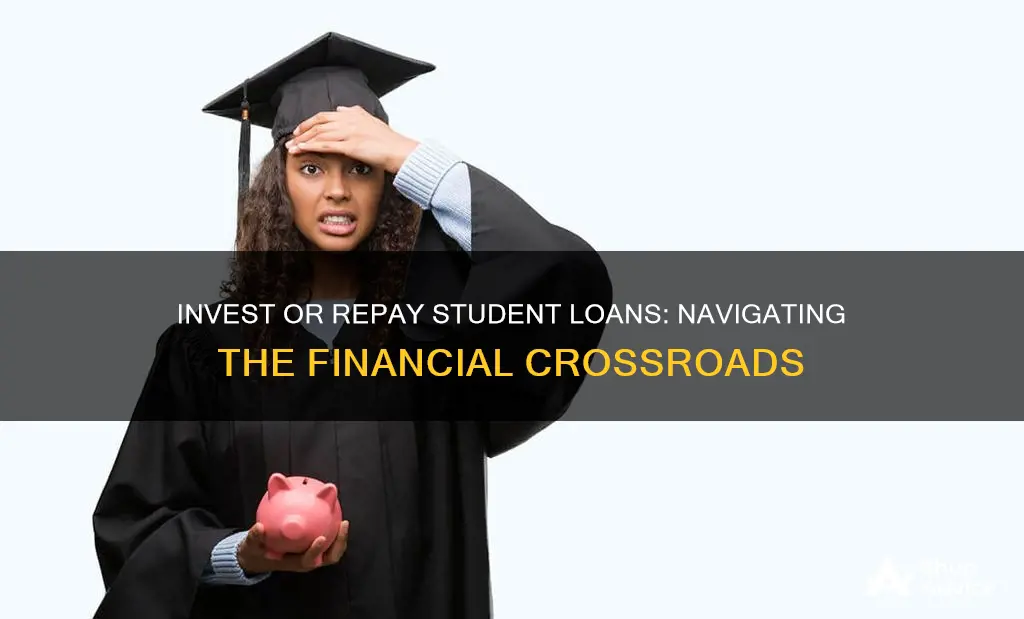
Whether you should invest or pay off your student loans depends on your financial goals and how you feel about debt. If you want to become debt-free quickly, putting your extra money towards paying off your student debt is ideal. However, investing could be a better option if your expected rate of return is higher than your student loan's interest rate or if you want to work on your financial security.
If you have high-interest student loans, especially private loans, you should prioritise paying them off. The same goes if having debt causes you emotional stress, or if you don't qualify for any income-driven repayment plans or student loan forgiveness programmes.
On the other hand, if your student loan interest rate is low and you expect long-term returns on invested assets to be higher, investing may be the better option. You may also want to invest if your employer offers to match the amount you invest, or if you can maximise tax deductions from both retirement contributions and student loan interest.
You don't necessarily have to choose one over the other. It's possible to invest a portion of your discretionary income while still tackling your student loan debt.
| Characteristics | Values |
|---|---|
| Interest rates | Student loan interest rates vary, with federal loans generally having lower interest rates than private loans. |
| Debt burden | High-interest debt can cause emotional stress and impact the ability to achieve financial goals, such as homeownership. |
| Cash flow | Those with low discretionary income may choose to pay off student loans first, while those with higher incomes may invest. |
| Financial goals | Becoming debt-free is a top priority for some, while others may prioritize building wealth for the future. |
| Tax benefits | Tax savings from retirement investments may outweigh the interest costs on student loans. |
| Employer assistance | Some employers offer student loan repayment assistance or matching contributions for retirement plans. |
| Loan forgiveness | Federal student loans may be eligible for forgiveness programs, which can influence the decision to invest or pay off loans. |
| Investment risk | Investments carry the risk of losing money, while paying off debt is a guaranteed return. |
What You'll Learn

Weigh up the interest rates on your student loans against potential investment returns
When deciding whether to invest or pay off student loans, it's important to weigh up the interest rates on your student loans against potential investment returns. This involves considering your financial goals, the type of student loan you have, and the potential risks and benefits of each option.
If you have high-interest student loans, particularly private loans, it is generally recommended to prioritise paying off these loans before investing. Private student loans typically have higher interest rates than federal loans and may have fewer benefits and repayment programs available. By paying off private loans first, you can reduce the amount of interest you pay over time and become debt-free sooner, which can lower your debt-to-income ratio and make it easier to qualify for a mortgage.
On the other hand, if you have low-interest student loans, investing may be a more attractive option. The potential returns on investments could outweigh the interest you're paying on your student loans. For example, the long-term average annual return of the S&P 500 is about 10%, which is higher than the interest rate on many student loans. However, it's important to remember that investing in the stock market carries risks and doesn't guarantee returns each year.
Another factor to consider is your emotional and psychological comfort with debt. For some people, the stress and anxiety caused by debt may outweigh the potential financial benefits of investing. In this case, prioritising debt repayment can provide peace of mind and improve your overall financial wellbeing.
Ultimately, the decision to invest or pay off student loans depends on your individual circumstances, risk tolerance, and financial goals. It may be beneficial to consult with a financial advisor to help you understand your options and make a decision that aligns with your priorities.
Investment Influx: Output Demand Shift
You may want to see also

Consider your financial goals and how comfortable you are with debt
When deciding whether to invest or pay off student loans, it's important to consider your financial goals and comfort level with debt. Here are some key points to keep in mind:
Evaluate your financial situation and goals
Before making any decisions, it's crucial to understand your financial situation and goals. Are you aiming to be debt-free as soon as possible, or are you comfortable carrying some debt while building wealth for the future? Do you need to get out of debt to qualify for a mortgage or achieve other financial milestones? Be honest with yourself about your priorities and what makes the most sense for your circumstances.
Weigh the benefits of paying off student loans early
Paying off student loans early can bring peace of mind and reduce the total interest paid over time. It can also improve your debt-to-income ratio, making it easier to qualify for a mortgage. However, it may not be the best option if you're working towards loan forgiveness or have a low-interest rate on your student loans.
Consider the potential returns on investments
If the potential returns on your investments are higher than the interest rate on your student loans, investing may be a more attractive option. For example, if you're paying 4% interest on your student loans, but you could potentially earn a 10% return on investments, investing might be the better choice. Keep in mind that investing carries risks and doesn't guarantee returns every year.
Understand the type of student loans you have
Federal and private student loans have different terms, benefits, and interest rates. Federal loans typically have lower interest rates and offer benefits like Public Service Loan Forgiveness. Private student loans may have variable interest rates and fewer benefits. Evaluate the specific terms of your student loans to make an informed decision.
Factor in your comfort level with debt
How you feel about debt is a crucial consideration. If carrying debt causes emotional stress and being debt-free would bring peace of mind, paying off your student loans early may be the best option for your well-being. On the other hand, if you're comfortable with debt and believe that investing will help you build wealth faster, investing could be the right choice.
Seek professional advice
If you're unsure how to balance investing and paying off student loans, consider consulting a financial advisor or counsellor. They can help you evaluate your financial situation, goals, and risk tolerance to create a plan that aligns with your priorities. Remember, it's not always an either-or decision; you may be able to invest and pay off debt simultaneously.
Retirement Planning: Overcoming Investment Inertia
You may want to see also

Evaluate your cash flow and monthly budget
Evaluating your cash flow and monthly budget is crucial when deciding between investing and paying off student loans. Here are some paragraphs to help you with that:
Understanding your financial situation
Firstly, it's important to understand your financial situation and goals. Do you want to become debt-free quickly, or are you comfortable carrying some debt while building an emergency fund or investing? Are you able to put portions of your discretionary income toward both investing and debt repayment? Evaluating your financial priorities and comfort level with debt is essential.
Evaluating your cash flow
Understanding your cash flow involves tracking your income and expenses over a given period. This helps you determine how much money you have left after covering your necessities, also known as discretionary income. If your cash flow is tight and student loan payments are a burden, you may want to focus on paying down your debt. On the other hand, if your debt is manageable and you have sufficient discretionary income, you may lean towards investing or saving for retirement.
Building an emergency fund
Before deciding between investing and paying off student loans, it's generally recommended to have an emergency fund in place. This ensures that you have a safety net for unexpected expenses. Aim to save at least three months' worth of expenses, and continue building your emergency fund until you reach a comfortable level.
Managing high-interest debt
It's important to differentiate between "good debt" and "bad debt." Good debt, such as student loans and mortgages, typically carries lower interest rates, and there is no urgency to pay it off quickly. In contrast, bad debt, such as credit card debt, often comes with high interest rates and should be prioritised for repayment. Ensure you are effectively managing any high-interest debt before deciding between investing and paying off student loans.
Weighing the opportunity cost
When deciding between investing and paying off student loans, consider the opportunity cost. Compare the interest rate on your student loans with the potential returns on investments. If you expect to earn a higher rate of return on your investments than the interest rate on your student loans, investing may be more advantageous. However, if your student loan interest rate is higher, paying off the debt may be a better option.
Considering tax benefits and employer assistance
Don't forget to factor in tax benefits and employer assistance when evaluating your cash flow and budget. Contributions to retirement accounts, such as a 401(k) or IRA, may provide tax advantages. Additionally, some employers offer student loan repayment assistance or matching contributions for retirement savings. These factors can impact your decision between investing and paying off student loans.
Smart Ways to Invest $500 Today
You may want to see also

Assess the impact on your debt-to-income ratio
When deciding whether to invest or pay off student loans, it's important to assess the impact on your debt-to-income ratio (DTI). This ratio is a significant factor considered by lenders when evaluating your eligibility for new credit, especially mortgage loans.
Your DTI is calculated by dividing your total monthly debt payments (including student loans) by your gross monthly income before taxes. Lenders typically prefer a DTI of 45% or lower, though some may accept a higher ratio. Student loans increase your DTI, making it more challenging to qualify for a mortgage or other types of credit.
For example, if you earn a gross monthly income of $5,000 and have a mortgage loan payment of $1,400, your DTI without student loans would be roughly 38%, which is below the preferred threshold. However, if you have an additional student loan payment of $250, your DTI climbs to 40%, and with a $550 student loan payment, it reaches 46%, which is less desirable.
A higher DTI can make it more difficult to obtain new credit or a mortgage, as lenders may view it as an increased risk of defaulting on loan payments. Therefore, paying off student loans can help improve your DTI and make you a more attractive borrower.
On the other hand, investing instead of aggressively paying off student loans may be a viable option if the expected return on investment is higher than your student loan interest rates. For instance, if you can consistently earn a return of 6% or more on your investments, it may be more advantageous to invest rather than pay off student loans with lower interest rates.
Ultimately, the decision to invest or pay off student loans depends on various factors, including your interest rates, financial goals, and risk tolerance. It's important to carefully consider the impact on your DTI and weigh it against your other financial priorities when making this decision.
American Eagle Inc: A Smart Investment Move
You may want to see also

Explore tax benefits and employer assistance
The US government's Internal Revenue Service (IRS) has outlined some of the tax benefits and employer assistance available to those with student loan debt.
Under federal law, employers with educational assistance programs can use them to help pay student loan obligations for their employees. This option has been available for payments made after 27 March 2020 and will continue to be available until 31 December 2025.
Educational assistance programs have traditionally been used to pay for books, equipment, supplies, fees, tuition and other education expenses for the employee. Now, they can also be used to pay principal and interest on an employee's qualified education loans. Payments can be made directly to the lender, or to the employee, and are limited to $5,250 per employee per year.
Employers who don't have an educational assistance program may want to consider setting one up, as it can help attract and retain qualified workers. These programs must be in writing and cannot discriminate in favour of highly compensated employees.
There are also tax benefits for employers who offer student loan repayment assistance. Employer student loan repayments are deductible as an ordinary business expense and therefore reduce the company's taxable gross profit. They are also not subject to additional payroll taxes such as social security or Medicare taxes.
For employees, employer student loan repayments are tax-free. This means that as an employee, you will receive 100% of every benefit dollar you expect to receive. Fringe benefits are usually considered a form of compensation and are included in your gross taxable income, but employer student loan repayments are legally exempt from income and payroll taxes.
S&P 500: Invest Now or Wait?
You may want to see also
Frequently asked questions
Paying off your student loans early can bring peace of mind, reduce the amount of interest you pay over time, and improve your debt-to-income ratio (DTI), making it easier to qualify for a mortgage.
You may miss out on building wealth by investing, and you could lose out on potential debt cancellation benefits.
You can start building wealth immediately, with the potential to retire early, and you may be able to take advantage of an employer match.
Returns might not always be sufficient, and there's a risk of losing your principal investment.







